- medicalnewstoday.com - Vitamin B12 benefits, food sources, deficiency symptoms, and everything else you need to know
- webmd.com - VITAMIN B-12 - Uses, Side Effects, and More
- ods.od.nih.gov - Vitamin B12
- healthline.com - Top 12 Foods That Are High in Vitamin B12
- health.clevelandclinic.org - Vitamin B12 Benefits and Best Sources
- prolekare.cz - A comprehensive look at vitamin B12 deficiency in childhood
Vitamin B12: What are its effects and what are the symptoms of deficiency? + Resources

Vitamin B12 is very important for the proper functioning of our body. What are its effects? What are the known sources of vitamin B12?
Article content
- Some of the history of vitamin B12
- What are the effects of vitamin B12?
- How does vitamin B12 affect different systems of our body?
- What are the sources of vitamin B12?
- Who can suffer from vitamin B12 deficiency?
- Is vitamin B12 deficiency common?
- What is the diagnosis of vitamin B12 deficiency?
- What is the recommended daily intake of vitamin B12?
- Vitamin B12 in dietary supplements
- Vitamin B12 in topical preparations
- Vitamin B12 in injectable form
Natural forms of vitamin B12 include:
- methylcobalamin - essential for the metabolism of central nervous system cells
- adenosylcobalamin - important for the formation of the myelin sheath of the nerve cell
Both forms are directly involved in the metabolism of amino acids and fats.
The industrially produced forms of vitamin B12 include:
- Cyanocobalamin
- hydroxycobalamin
These forms are found in medications and dietary supplements. They are converted to active forms in the human body. Methylcobalamin and adenosylcobalamin are considered the active forms.
Vitamin B - B complex and effects on the body? + Natural sources
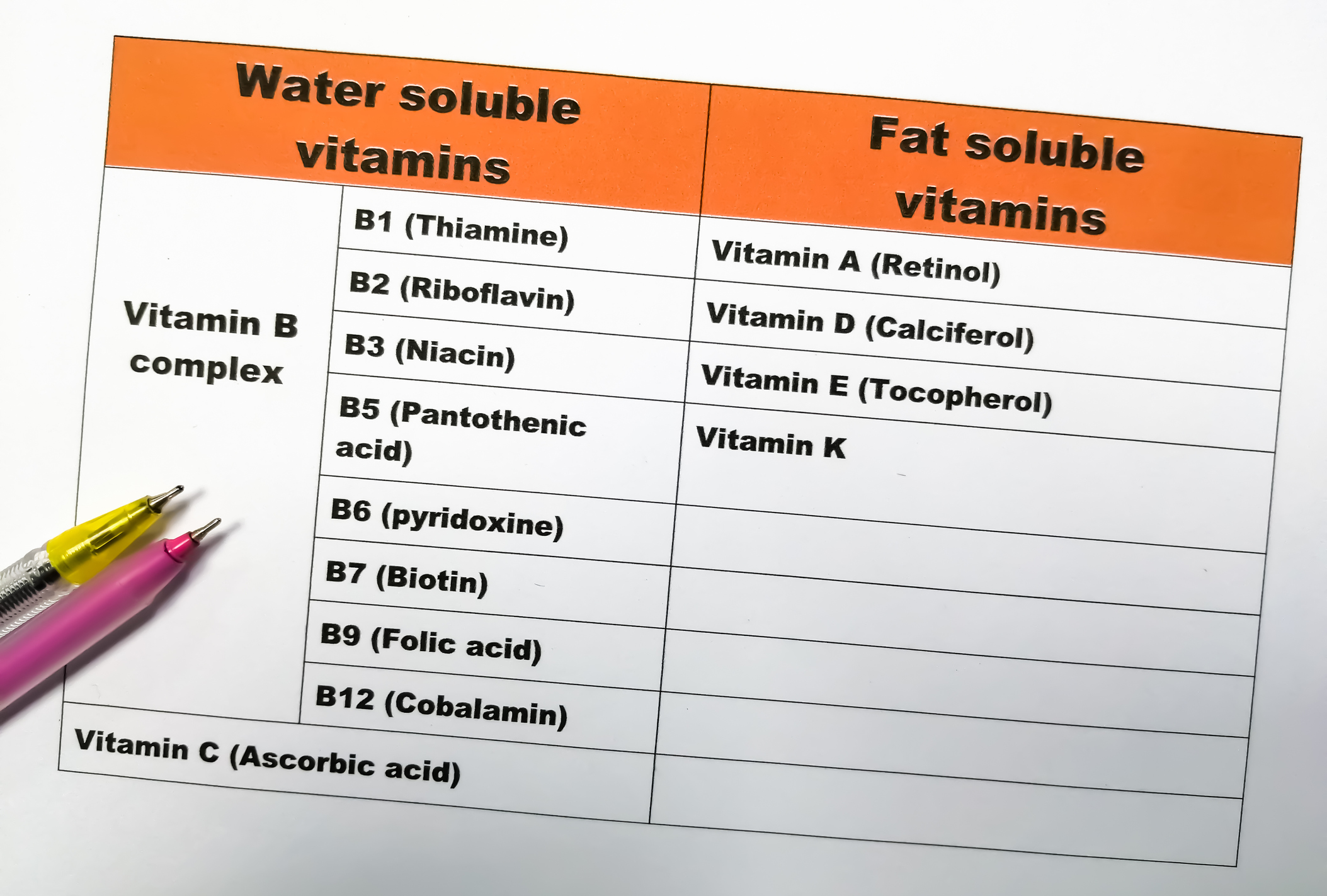
Some of the history of vitamin B12
Disorders of vitamin B12 metabolism came to greater attention in the 1850s. English physician Thomas Addison described a link between vitamin B12 and pernicious anemia. Patients who suffered from anemia also had other symptoms.
Other symptoms included pathological changes in the gastric mucosa and a lack of stomach acid. At the same time, they suffered from inflammation of the tongue, impaired coordination of movements and trembling of the hands and feet.
Richard Minot, a professor at Harvard University in Cambridge, came up with a revolutionary idea.
In 1934, together with George Hoyt Whipple and William Parry Murphy, they were awarded the Nobel Prize for successfully treating severe anaemia with raw liver.
In 1948, the American chemist Karl August Folkers succeeded in isolating an "anti-malignant anaemia factor" known as vitamin B12 - cobalamin.
The structure of vitamin B12 was first described by the English biochemist Dorothy Crowfoot-Hodgkin in 1956. In 1964 she was awarded the Nobel Prize in Chemistry for this discovery.
What are the effects of vitamin B12?
Vitamin B12 has many important functions in the human body:
- it is involved in the formation of red blood cells
- supports the normal development and function of the nervous system
- participates in the formation of DNA
- influences protein and fat metabolism
- it is involved in the metabolism of serotonin and dopamine
- protects against birth defects
Did you know...
Vitamin B12 deficiency can manifest, especially in adulthood, with sleep disorders, emotional disturbances and compulsive-obsessive disorders. Some researchers believe there is a link between vitamin B12 deficiency and the progression of Alzheimer's disease.
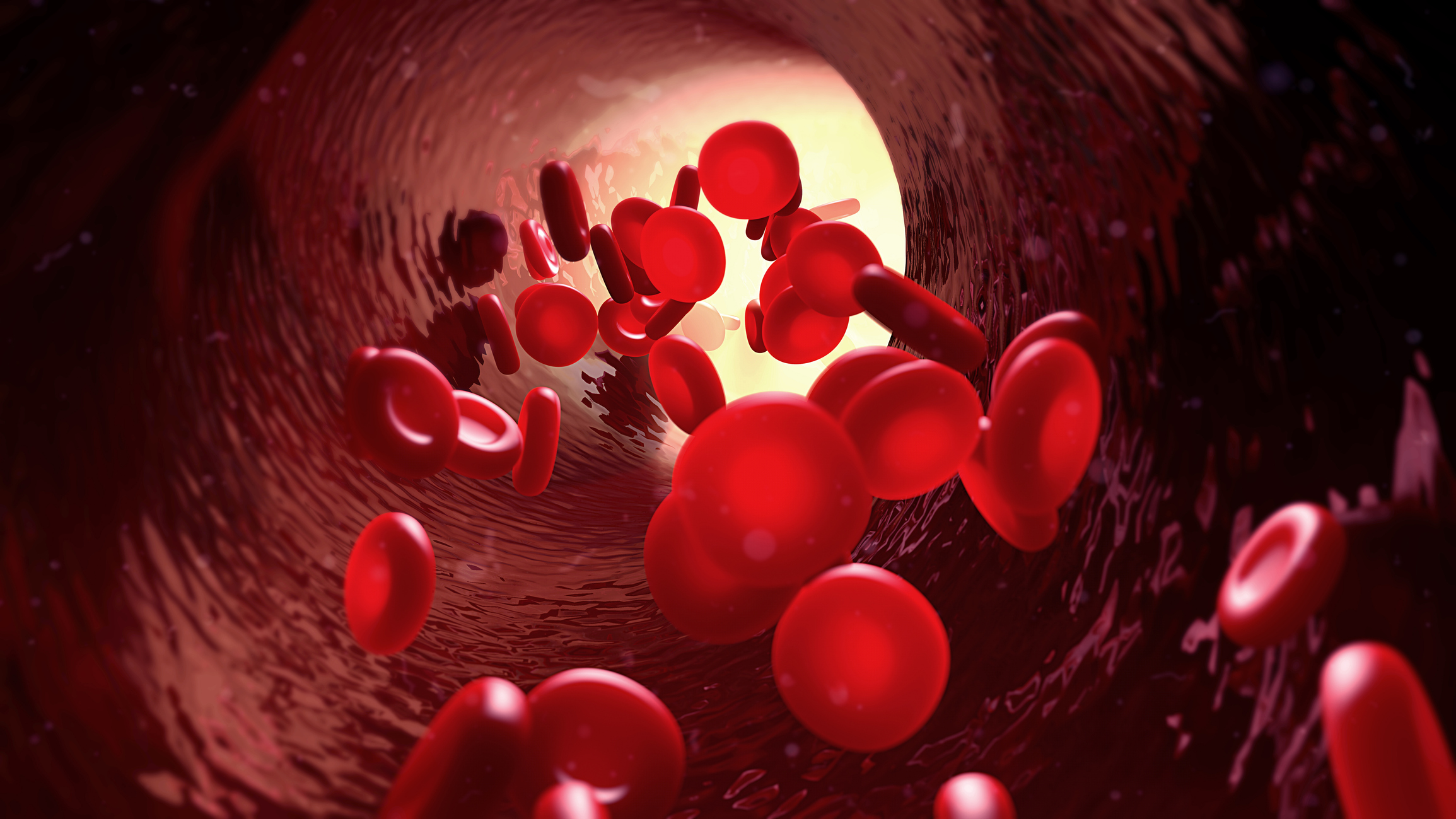
How does vitamin B12 affect different systems of our body?
1. The nervous system and the psyche
Vitamin B12 is essential for the proper functioning of the central nervous system. Its levels affect our mental health. According to some studies, vitamin B12 deficiency is associated with a greater risk of depression.
People who suffer from low or insufficient levels of vitamin B12 may have trouble concentrating and completing tasks.
Vitamin B12 deficiency can negatively affect motor and sensory nerve function. Some patients may experience muscle spasms.
One of the neurological symptoms of vitamin B12 deficiency is impaired coordination of movements. Vitamin B12 deficiency can cause problems with walking and maintaining balance.
2. Eyesight
Vitamin B12 also affects our eyesight. Vitamin B12 deficiency can cause vision problems. These are the result of damage to the optic nerve. The shrinking of the optic nerve is manifested by a slow decline in visual acuity.

3. Digestive tract
The best source of vitamin B12 is meat. Especially meat from herbivorous animals. Milk and eggs are excellent sources. The daily consumption of vitamin B12 is 1.6 to 4 µg.
Vitamin B12 is absorbed in the lower part of the small intestine. An intrinsic factor is required for its absorption. The intrinsic factor is glycoprotein. This is formed in the parietal cells of the gastric mucosa.
The intrinsic factor forms a complex with vitamin B12. This complex binds to specific receptors. These are located on the mucosa of the lower small intestine. This is the only route by which vitamin B12 enters the blood.
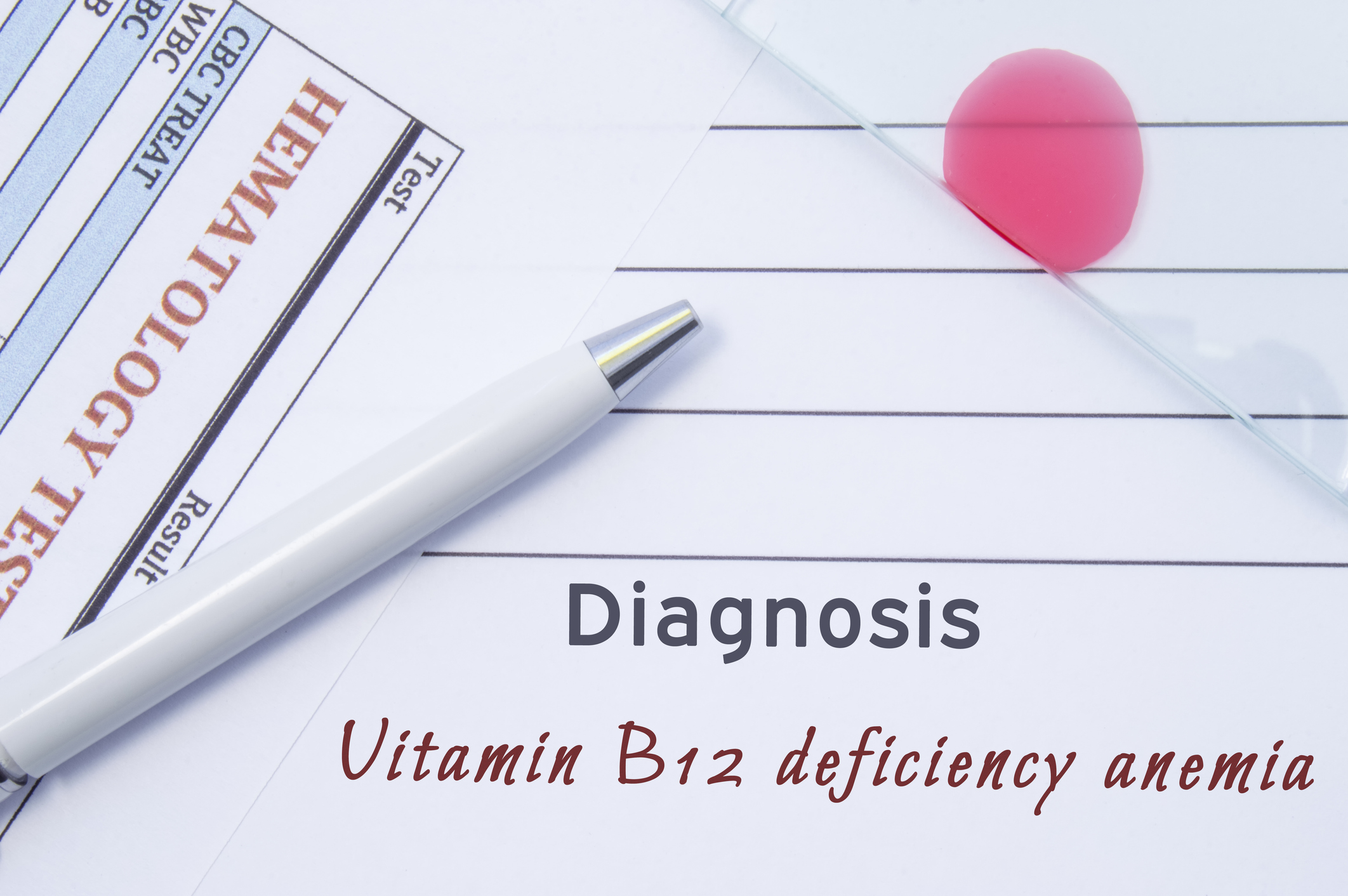
Have you heard of pernicious anemia?
Malignant anaemia is caused by a deficiency of vitamin B12. It is autoimmune. Autoantibodies to the parietal cells of the stomach are involved. Their action leads to the breakdown of glandular cells in the broadest area of the stomach.
The result is:
- lack of hydrochloric acid in the stomach.
- disturbances in the production of intrinsic factor
- poor absorption of vitamin B12
Vitamin B12 deficiency can cause a number of digestive problems:
- diarrhea
- nausea
- constipation
- bloating
- flatulence
Vitamin B12 deficiency can also affect our tongue. Symptoms include an inflamed, red and painful tongue. In some people, these symptoms occur together with inflammation of the oral mucosa.
Oral mucositis manifests itself as sores and inflammation in the mouth.
4. Sex life
Vitamin B12 also affects male fertility. Vitamin B9 and vitamin B12 are very important for proper homocysteine metabolism. Their deficiency can lead to disorders of homocysteine metabolism. As a result, there is an accumulation of it. This can lead to endothelial disorders.
What does this mean for men?
Men who are deficient in vitamin B12 may suffer from erectile dysfunction. Which is a result of increased levels of homocysteine in the body.
5. DNA formation
Vitamin B12 is essential for purine metabolism. It interferes with DNA formation and cell division. Vitamin B12 deficiency inhibits DNA duplication and cell division. Rapidly dividing cells (hematopoietic precursors) are particularly affected.
The hematopoietic disorder is manifested by:
- megaloblastic anaemia with erythrocyte macrocytosis
- a reduction in the number of developmental stages of red blood cells
- reduced white blood cell count
- decreased platelet count
- typical picture of impaired maturation of precursors in the bone marrow
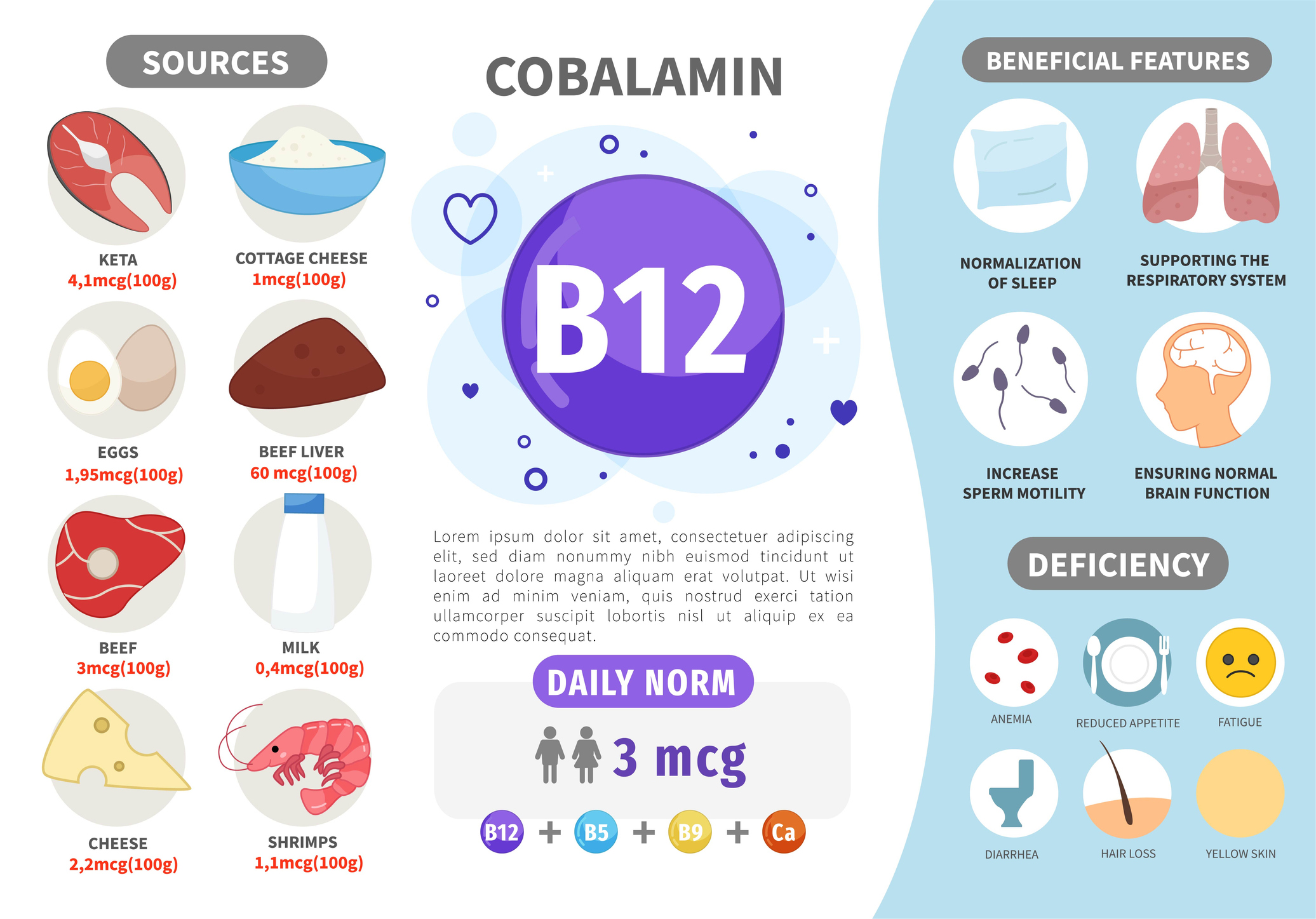
What are the sources of vitamin B12?
The human body cannot make vitamin B12. Therefore, it must be taken from the diet. However, it is not found in foods of plant origin.
Some of the best sources from animal sources include:
- beef and pork liver
- poultry
- fish
- brewer's yeast
- hard cheeses
- egg yolk
Sources of vitamin B12 for vegetarians can be:
- seaweed spirulina
- bee pollen
- brewer's yeast
The causes of vitamin B12 deficiency can be different:
- insufficient intake - vegans, vegetarians
- poor absorption
- increased need - pregnancy, growth period (pregnancy, growth)
- utilization disorders - enzyme deficiency
Who can suffer from vitamin B12 deficiency?
The most at-risk groups of people include:
- people over 65 years of age
- pregnant women
- breastfeeding women
- children
- vegans
- vegetarians
- patients taking medication (diabetes, heartburn)

Is vitamin B12 deficiency common?
It is estimated that up to 15% of people in the world may be deficient in vitamin B12.
Vitamin B12 deficiency in different age groups is as follows:
- At least 3% of people aged 20-39 years
- At least 4% of people aged 40-59 years
- At least 6 % of people aged 60 years and over
What is the diagnosis of vitamin B12 deficiency?
The diagnosis of vitamin B12 deficiency consists of the following 3 steps:
- Peripheral blood examination - hemogram, reticulocytes, morphology
- Vitamin B12/folate levels
- Homocysteine/methylmalonic acid levels
What is the recommended daily intake of vitamin B12?
The recommended daily intake of vitamin B12 varies. The recommended daily intake of vitamin B12 increases with age.
| Age | Recommended daily intake in μg |
| From birth to 6 months | 0,4 |
| 7-12 months | 0,5 |
| 1-3 years | 0,9 |
| 4-8 years | 1,2 |
| 9-13 years | 1,8 |
| 14+ | 2,4 |
Pregnant women need an increased intake of vitamin B12.
Vitamin B12 deficiency in pregnancy is associated with:
- a higher risk of preterm birth
- low birth weight of newborns
- the development of birth defects in children
During intrauterine life, the baby develops a vitamin B12 reserve of 25 µg. This can be depleted within the first 3 to 5 months of life.
Breastfed infants may develop vitamin B12 deficiency:
- delayed development
- irritability
- reduced appetite
In children, the symptoms of vitamin B12 deficiency are much more dramatic than in adults. The most serious manifestations of vitamin B12 deficiency include damage to brain structures.
General symptoms of vitamin B12 deficiency include sleep disturbances and lack of appetite.
Of the neurological manifestations, the following may occur:
- developmental delay
- increased drowsiness
- apathy to comatose state
- muscle hypotonia
In some cases, there may be:
- brain atrophy
- premature closure of the large fontanelle with macrocephaly
Severe and prolonged vitamin B12 deficiency in children can cause delayed speech development. Some may experience cognitive slowing, behavioural and concentration disorders. Some may even develop epilepsy.
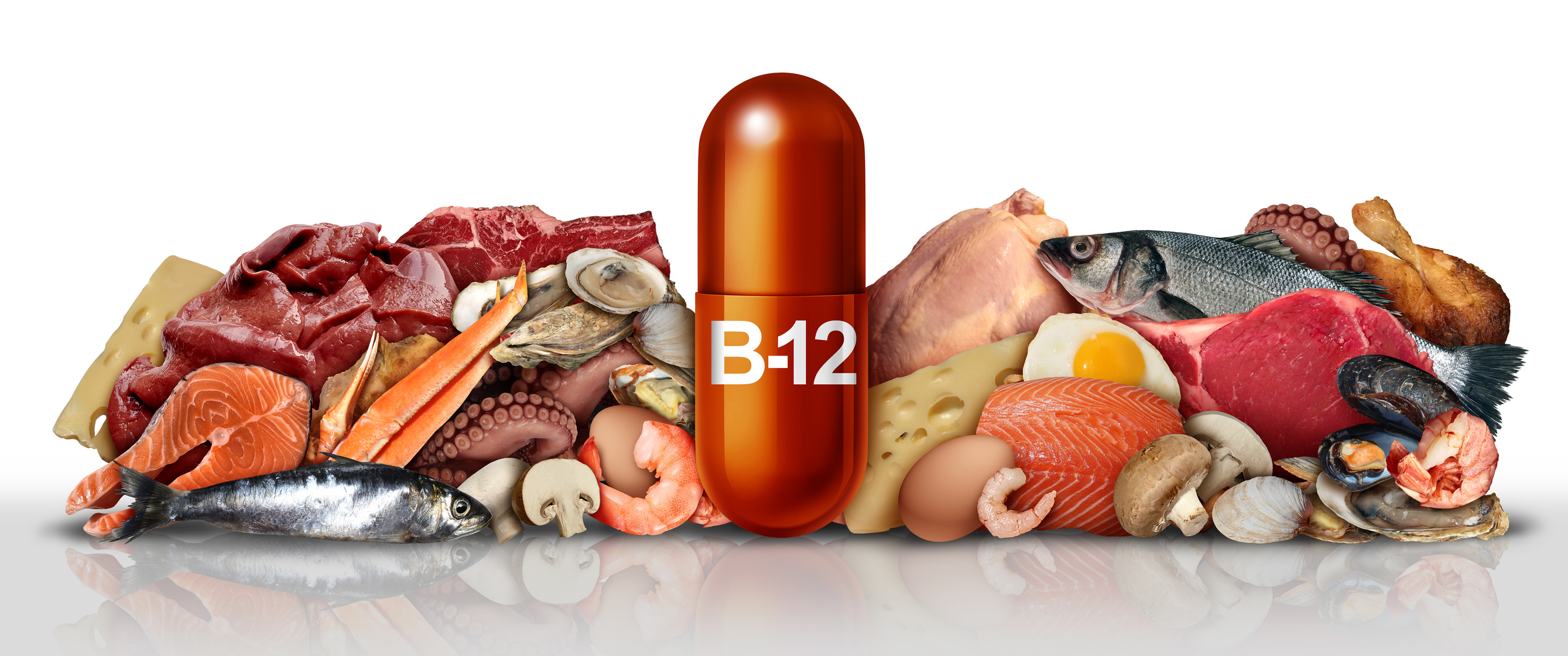
Vitamin B12 in dietary supplements
Vitamin B12 is a natural part of some foods (e.g. meat, milk, eggs and fish). It is also added to some foods (e.g. cereals, bread). It is also included in foods and supplements.
Dietary supplements containing vitamin B12 are recommended for the following conditions:
- people who are at risk of vitamin B12 deficiency
- elderly people
- pregnant or breastfeeding women
- vegetarians and vegans
- patients suffering from digestive disorders
Dietary supplements with vitamin B12 are available in several forms:
- tablets
- chewable tablets
- gradual-release tablets
- solution
The use of vitamin B12 dietary supplements is intended for:
- supporting the proper functioning of the nervous system and psyche
- reducing feelings of tiredness and fatigue
- Ensuring the proper production of red blood cells
- support homocysteine metabolism
- ensuring the metabolism of carbohydrates and fats for energy production
Did you know that....
Results of a scientific study showed that people with low vitamin B12 levels replenished their stores after 90 days of taking supplements.
Vitamin B12 is often combined with other substances.
Products containing these combinations are available in pharmacies:
- Vitamins B6, B9 and B12
- uridine, palmitoylethanolamide, B vitamins (B1, B6, B12), vitamin C and biologically active folate
- vitamin C, iron and vitamin B12
- silicon, vitamin C, zinc, vitamins B7, B9 and B12
- natural magnesium from the Dead Sea and vitamins B6 and B12
Vitamin B12 in topical preparations
Vitamin B12 is an active ingredient in ointments, creams and gels. These are used to treat atopic dermatitis and psoriasis. Vitamin B12 has an anti-inflammatory effect. In addition, it soothes itching and redness.
In combination with unsaturated omega-3 fatty acids, it restores the damaged skin barrier.
Vitamin B12 in injectable form
The injectable solution contains vitamin B12 in the form of cyanocobalamin or hydroxocobalamin. Vitamin B12 is most commonly administered in 2 ways. Either intramuscularly or subcutaneously.
It can also be administered intravenously by drip infusion. This form is part of the nutrition injected into the bloodstream.
Vitamin B12 in injectable form is used:
- to treat pernicious anaemia
- to prevent and treat vitamin B12 deficiency
- as a diagnostic tool in the Schilling test. Administration of cyanocobalamin can detect polycythemia (a disease characterised by an increased volume of red blood cells (erythrocytes) in the blood)
Interesting resources










